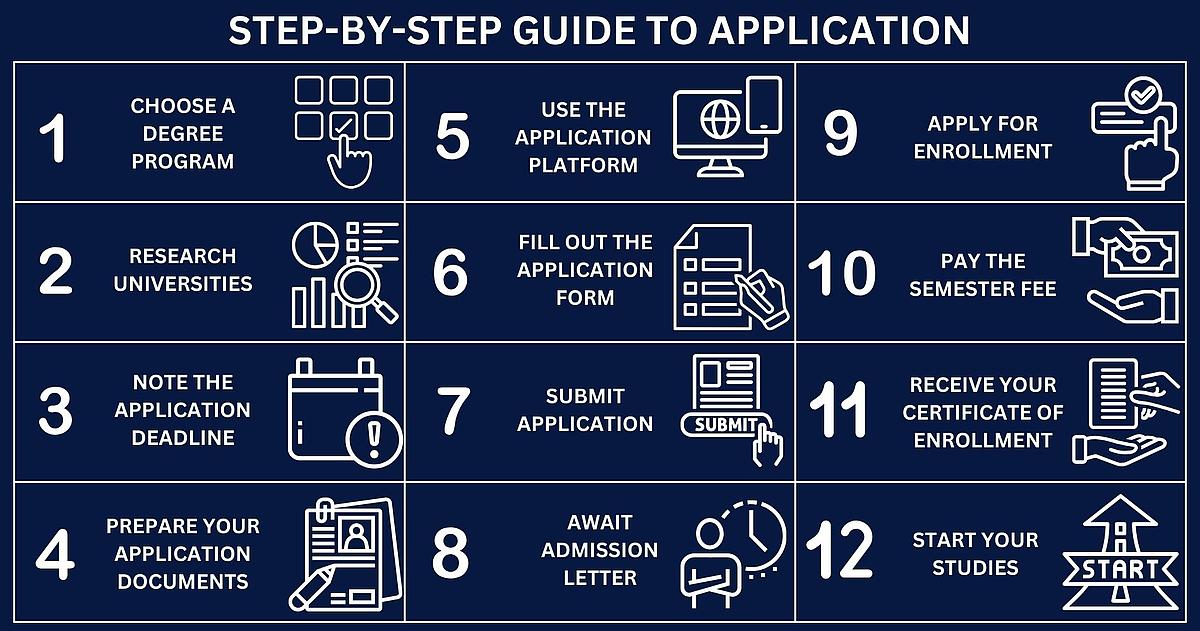This Website uses cookies to improve your visit on our website. More Info
How to apply for a study program? ✓ The ultimate Checklist
Applying for a course of study is often the first step towards an academic career and a professional future. However, the application process can vary depending on the course of study and university, and sometimes seems complex. This article explains step by step how to successfully apply for a course of study – from selecting the right program and compiling the required documents to deadlines and submitting the application. This makes the path to your dream study program clear and manageable.
Why should you apply to study?
A course of study offers you the opportunity to develop both professionally and personally and to receive a sound academic education. It opens up better career opportunities, as many professions today require or prefer a university degree. It also allows you to delve deeply into a subject area, develop your own interests and Studies also offer the chance to gain new experiences, work independently and strengthen skills such as critical thinking, problem solving and teamwork.
If you are not yet sure whether you actually want to study, then please take a look at our page “Apprenticeship or study?”.
Apprenticeship or study?The Difference between Applying and Registering
This table shows the main differences between the application process and subsequent enrollment at a university.
| Aspect | Apply | Enrol |
|---|---|---|
| Definition | Application for admission to a degree program | Official step to be enrolled as a student at the university |
| Goal | To get a place at university | Accept the place and start your studies |
| Timing | Before being accepted by the university | After admission, when you have accepted the place |
| Documents required | Application documents (certificates, letter of motivation, résumé, etc.) | Letter of admission, health insurance certificate, further certificates if applicable |
| Procedure | Selection and decision-making process by the university | Formal registration at the university |
| Status | You have not yet been accepted as a student | You are officially a student and can start your studies |
| Deadlines | Usually several months before the start of studies | Shortly after acceptance (often a few weeks before the start of studies) |
Step-by-step guide to applying
Applying for a place at university can seem complex at first glance, especially when there are various deadlines and requirements to be aware of. To make the process easier for you and to ensure that you don't miss anything important, this step-by-step guide provides a clear and comprehensive overview. From choosing the right course to successfully enrolling, this is where you will find everything you need to know to prepare and apply successfully.
Overview: Step-by-Step Guide to Application
Here is a graphic overview of the step-by-step guide to application that you can follow to ensure a successful application for your studies.

Explanation: Step-by-Step Guide to Application
This is where the step-by-step guide to applying for a place on a study program is explained in more detail, so that you know exactly what to do:
1. Choose a degree program
- Find out about different degree programs and decide which one matches your interests, goals and abilities.
- Check the admission restrictions (e.g. grade point average, aptitude tests) and requirements for your desired degree program.
2. Research universities
- Select the appropriate universities that offer the desired degree program.
- Find out about the application requirements and deadlines on the universities' websites.
3. Note the application deadline
- Make sure you meet the application deadlines for the winter or summer semester. These are usually between July 15 for the winter semester and January 15 for the summer semester.
4. Prepare your application documents
- Make sure you have prepared all the required application documents. These may include:
- A-levels certificate or other university entrance qualification
- Résumé
- Letter of motivation (if required)
- Language certificates (e.g. TOEFL, TestDaF)
- Proof of internships (if necessary)
- Passport photo (depending on the university)
5. Use the application platform
- Depending on the course of study and university, you have to apply either directly to the university or via central platforms such as hochschulstart.de.
- hochschulstart.de is where you apply for subjects with nationwide admission restrictions, such as medicine, dentistry, veterinary medicine and pharmacy.
6. Fill out the application form
- Fill out the university's application form completely and correctly. This is often done via an online portal.
- Make sure to provide all the information accurately and upload the required documents.
7. Submit application
- Submit your application by the deadline. Make sure that all required documents have been uploaded correctly or sent by post.
8. Await admission letter
- After submission, the university will review your application. If you meet all the requirements and are offered a place, you will receive an admission letter.
- If the degree program has admission restrictions, you may have to hope for a succession procedure if you are not admitted immediately.
9. Apply for enrollment
- After receiving the letter of admission, you must enroll at the university within the given deadline.
- The following documents are usually required for this:
- letter of admission
- proof of health insurance
- proof of payment of the semester fee
- ID card or passport
10. Pay the semester fee
- You must pay the semester fee before enrolling. This is a requirement for official enrollment.
11. Receive your certificate of enrollment
- After successful enrollment, you will receive your certificate of enrollment, which confirms that you are now officially enrolled as a student.
- With this certificate, you can also take care of other things, such as using the semester ticket for public transport.
12. Start your studies
- Now you are ready to start your studies! Take part in the introductory events, register for courses and plan your course of study.

To find out the exact application process and deadlines at Munich Business School, as they differ slightly from these instructions, please visit the following page:
FAQs about MBSThe Application Deadlines
for Studies

The Application Deadlines for Studies
| Type of degree program | Application deadline for the winter semester | Application deadline for the summer semester |
|---|---|---|
| Degree programs with admission restrictions (NC, Numerus Clausus) | May 31 to July 15 (depending on the university) | January 15 to March 15 (depending on the university) |
| Degree programs without admission restrictions | July 15 (later deadlines in some cases) | January 15 (later deadlines in some cases) |
| Application via hochschulstart.de (e.g. medicine, pharmacy) | May 31 to July 15 | January 15 to March 15 |
| Master's programs | Vary, often May 31 to July 15 | Vary, often by January 15 |
| Private universities | Individual deadlines, often possible year-round | Individual deadlines, often possible year-round |
Important Information:
- The deadlines may differ depending on the federal state or university, type of admission and degree program. It is always advisable to check the exact deadlines on the website of the respective university.
- Different deadlines may apply to international applicants or special degree programs.
- Some universities offer succession procedures or lottery procedures,
It is important to find out about the application deadlines early on in order to have enough time to prepare the application documents.
Required Application Documents for Studies
The application documents for a course of study can vary depending on the university, the course of study and the type of degree. In general, however, applicants need the following documents:

- Application form:
- The official university form that must be submitted online or in paper form. Many universities have an online application portal for this purpose.
- Higher education entrance qualification (HZB):
- The Abitur certificate or a comparable school leaving certificate (e.g. vocational diploma or international certificates such as the IB).
- For foreign degrees: recognition of the degree in Germany.
- Letter of motivation:
- Explains the personal reasons for the Choice of Study and why you have decided on this course of study and this university.
- Not required for all courses, but often for subjects with restricted admission or master's programs.
- Résumé:
- Tabular overview of previous school and professional experience, relevant experience (internships, part-time jobs, engagements) as well as personal information.
- Proof of language skills:
- If the studies are conducted in another language (e.g. English), language tests (e.g. TOEFL, IELTS) are required.
- For international applicants: Proof of knowledge of German (e.g. DSH, TestDaF) for German-language degree programs.
- Aptitude or admission test:
- Some degree programs (e.g. art, music, sports) require additional exams or tests to verify your aptitude for the subject.
- Proof of internships:
- For certain degree programs (e.g. social work, teaching), proof of a pre-study internship is often required.
- Copies of ID card/passport:
- Particularly important for international students.
- Letters of recommendation (optional):
- In some cases, especially for master's programs, a letter of recommendation from teachers or employers can be useful.
- Proof of health insurance (for enrollment):
- Proof of health insurance is required to enroll at a German university.
- Passport photo (not always required):
- Some universities require a current passport photo, usually for the student ID.
- Special requirements:
- Portfolio (for art programs)
- Bachelor's degree certificate (when applying for a Master's program)
- Overview of grades (if the degree is not yet available)
It is important to check with the respective university for the exact requirements, as these may vary slightly. A thorough and complete application increases the chances of a successful university placement.
How to Apply for a study program: public vs. private university
This table provides an overview of the main differences when applying for studies at public and private universities.
| Aspect | Public university | Private university |
|---|---|---|
| Application process | Standardized process, often via online portals | Often more individualized, sometimes with application forms |
| Admission restrictions | Often Numerus Clausus (NC) or other restrictions | Usually no admission restrictions, but with their own selection criteria |
| Deadlines | Fixed deadlines: July 15 (winter semester), January 15 (summer semester) | Often flexible, possible year-round |
| Costs | Low or no tuition fees, only a semester fee | Varying tuition fees. |
| Documents | High school diploma, résumé, letter of motivation if applicable | Often additional letters of motivation and recommendation. |
| Selection process | Based primarily on high school diploma grades or waiting semesters | Personal interviews, aptitude tests or assessment centers. |
| Application portals | Often via central platforms such as hochschulstart.de | Usually direct application via the university |
| Application documents | Standardized documents, depending on the degree program | Often additional requirements such as essays or projects |
| Admission procedure | Transparent and often standardized, clear rankings | Individual, more flexible admission decision |
| Application costs | No or low fees (usually only postage if applying by post) | Often additional processing fees |
The Admission Procedure for a Course of Study
The admission procedure for a course of study describes the process by which applicants are offered a place at a university. This process can vary depending on the degree program, university and type of admission restriction. These are the main steps in the admission procedure:
Submitting an Application
- The first step is to submit the application documents to the university by the deadline or via central platforms such as hochschulstart.de.
- Applicants must ensure that they submit all the required documents (certificates, résumé, letter of motivation, etc.) correctly and in full.
Checking the Documents
- The university or the central admissions office checks the application documents for completeness and correctness.
- If the application is incorrect or incomplete, it will usually not be considered.
Admission Restrictions and Selection Procedures
- Unrestricted degree programs: If the degree program does not have admission restrictions, all suitable applicants will be admitted.
- Degree programs with admission restrictions (Numerus Clausus - NC): For degree programs with a fixed number of places, selection is based on high school diploma grades (NC) or other criteria (e.g. number of semesters on waiting list, selection interviews, aptitude tests).
- Aptitude test: For artistic, athletic or other creative degree programs, aptitude tests must be taken in addition to the grades.
Centralized Allocation (hochschulstart.de)
- For subjects with nationwide admission restrictions, such as medicine, dentistry, veterinary medicine and pharmacy, allocation is carried out via the portal hochschulstart.de.
- Places are allocated according to a fixed allocation key: some of the places go to applicants with the best high school diploma grades, some to applicants with the longest waiting time and some according to the university's selection criteria.
Waiting Period
- Applicants who do not receive a university place accumulate waiting semesters. These are semesters in which they do not study after graduating from high school, which increases their chances in future applications.
Letter of Admission
- The university or hochschulstart.de informs the successful applicants by letter of admission that they have been offered a place at university.
- This letter states how and by when enrollment must take place.
Enrollment
- After receiving the letter of admission, applicants must enroll at the university in order to officially accept the study place.
- This includes submitting documents such as the letter of admission, a health insurance certificate and, if applicable, proof of payment of the semester fee.
Succession Procedure
- If admitted applicants do not accept their place, these places are awarded to the next applicants on the waiting list in a succession procedure.
- There are several rounds of the succession procedure, so that applicants with poorer grades still have a chance of being accepted.
Lottery
- If there are still free study places available after all the procedures have been completed, these will be awarded by lottery.
- In this case, the lottery decides independently of the high school diploma grades, and all interested parties can still apply at short notice.
Special features of the admissions process:
- Aptitude and selection interviews: In addition to certificates, some universities require applicants to take part in interviews or pass tests, such as at Munich Business School, where, in turn, no NC plays a role.
- Waiting semesters: These are counted if you do not start studying immediately after graduating from school. Waiting semesters can improve your chances when you apply later.
The admissions process requires careful planning and preparation in order to meet all deadlines and submit all required documents correctly. Applicants should find out about the specific requirements of their preferred universities in good time.
If you want to find out which admissions procedure MBS uses, please take a look at the corresponding pages for Bachelor's, Master's and MBA programs, or at the following page:
FAQs about MBSRestricted Admission for a Course of Study
A restricted admission policy means that the number of places available on a particular course is limited. Not every applicant is automatically offered a place; instead, the university selects applicants according to certain criteria. A restricted admission policy often requires applicants to be particularly well prepared in order to increase their chances of getting a place. It is important to be aware of the criteria of the respective university and, if necessary, to apply to several universities. The main types of restricted admission policy are as follows:
| Type of admission restriction | Description |
|---|---|
| Numerus Clausus (NC) | The most common form of admission restriction; the NC is not a fixed grade, but rather the value that results from the applications of the previous year and the high school diploma grades of the last admitted applicant. The more popular the degree program, the stricter the NC (e.g. for medicine, psychology, law). |
| Aptitude tests | For some degree programs (e.g. art, music, physical education), applicants must take a special exam to demonstrate their artistic or athletic abilities in addition to submitting their high school diploma grades. |
| Internal university selection procedures | Some universities use their own selection procedures that take into account not only high school diploma grades but also other criteria such as letters of motivation, internships, interviews or tests. This is particularly common for master's programs or specialized degree programs. |
| Nationwide admission restrictions | There are nationwide admission restrictions for subjects such as medicine, dentistry, veterinary medicine and pharmacy, with places being awarded centrally via the hochschulstart.de platform. |
| Local admission restrictions | Local admission restrictions mean that a degree program at a particular university has restricted admission, but may be offered at other universities without restriction. |
| Lottery procedure | If there are still places available after the regular selection procedure, these can be allocated by lottery. In this case, the decision is made by lot and not by high school diploma grades. |
| Reasons for admission restrictions | The demand for university places exceeds the supply (e.g. too few places for too many applicants); limited capacities at the university (e.g. personnel, room capacities). |
DID YOU KNOW THAT?
The Munich Business School admissions process does not use the Numerus Clausus, but instead focuses much more on the individual strengths of the applicants through interviews.
More on the SubjectEnrolment for a Course of Study
Enrolment (also known as registration) is the formal step by which you are officially accepted as a student at a university. It is only upon enrolment that you are registered as a regular student and receive all the rights and obligations associated with your studies. Here are the most important aspects of enrolment:

- When to enroll:
- Enrollment takes place after you have received your letter of admission.
- The letter of admission sets a deadline by which you must have enrolled. It is important not to miss this deadline, otherwise your place will be given to another applicant (e.g. through the succession procedure).
- Necessary documents: As a rule, the following documents must be submitted for enrollment:
- Letter of admission: Proof that you have been offered a place at university.
- ID card or passport: To verify your identity.
- Higher education entrance qualification: Your A-levels or equivalent qualification.
- Proof of health insurance: Proof of existing health insurance (either statutory or private). Students must be insured in order to study.
- Proof of payment of the semester fee: The semester fee covers administrative costs, the semester ticket for public transport and the contribution to the student union.
- Passport photo (if requested): For the student ID.
- Further documents: In some cases, additional documents are required, e.g. language certificates or proof of internships.
- Semester fee:
- Before enrolling, the so-called semester fee must be paid. This amount is not a tuition fee, but covers costs for the student union, administration and often the semester ticket (for local transport).
- The amount of the fee varies depending on the university and is usually between 150 and 350 euros per semester.
- Enrolment process: The enrolment process can vary depending on the university, but it generally involves the following steps:
- Apply for enrolment: This is usually done online, but sometimes papers have to be submitted in person.
- Submit documents: The university requires the above-mentioned documents, which are either uploaded via an online portal or sent by post.
- Pay the semester fee: After submitting the documents, you will receive a request for payment of the semester fee, which must be paid before final enrollment.
- Receive certificate of enrollment: After successful enrollment, you will receive a certificate of enrollment confirming your status as a student.
- Student status: Upon enrollment, you are officially accepted as a student at the university and receive all the associated rights and obligations. These include:
- Student ID: This serves as proof of identification and often offers discounts (e.g. on public transport, in museums or cinemas).
- Use of university facilities: Enrolment gives you access to libraries, computer centers, canteens and other university services.
- Participation in teaching: You are allowed to attend lectures, seminars and exams.
- Semester fee: After each renewed payment of the semester fee, you are automatically enrolled for the next semester (re-registration).
- Duties: Students must regularly register for exams, follow the course of study and pay the semester fee on time.
- Legal consequences of enrollment:
- By enrolling, the student acquires certain rights, including the right to student counseling, to use the university facilities and to take exams.
- At the same time, there are also obligations, such as complying with the examination regulations and re-registering for each new semester.
- Re-registration:
- At the end of each semester, students must re-register for the next semester. This is done by paying the semester fee again. Those who do not re-register by the deadline may be exmatriculated.
- Special features of enrollment:
- Multiple enrollment: As a rule, it is not allowed to enroll full-time at several universities at the same time, unless it is a second degree or a parallel study in two different degree programs.
- Enrollment as a guest student: Those who do not want full enrollment can often also enroll as guest students. This allows them to participate in certain courses, but not in exams.
Enrollment is the decisive step to officially begin your studies. It is important to pay close attention to the deadlines and requirements of the respective university in order not to lose your place.
Related Study Guides Topics:
What should I study?
Studying in Munich
Start of Studies
What can you study with a vocational diploma?
Choice of Study
FAQ
To write an application for university, you should first select the appropriate degree program and university. Find out about the admission requirements and gather the necessary documents such as your high school diploma, résumé, and, if applicable, a letter of motivation. Apply via the university's application portal or via hochschulstart.de if the degree program has restricted admission. Make sure to submit all documents by the deadline and then wait for the letter of admission.
To study a course without an NC, you apply directly to the university by submitting the required documents such as your high school diploma and other supporting documents. Since there are no admission restrictions, you will usually be admitted provided that you meet the formal requirements. Just make sure you meet the university's application deadline.
The application deadline for the winter semester is usually July 15, and for the summer semester, January 15. However, some universities may have different deadlines, so you should always inform yourself early.
You will usually receive feedback on your university application a few weeks after the application deadline, often in August for the winter semester and in February for the summer semester. The exact timing may vary depending on the university.
After graduating from high school, you should usually apply between May and July for the winter semester, depending on the deadlines of the respective university.
Interested in a study program? Request our information material now!
More exciting degree programs in Munich













